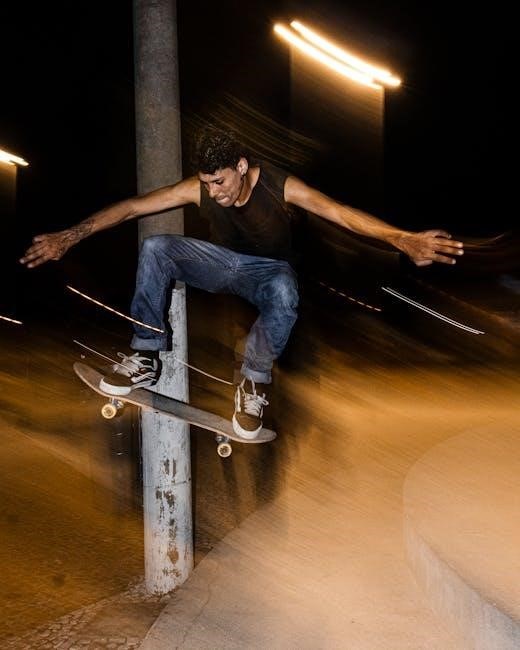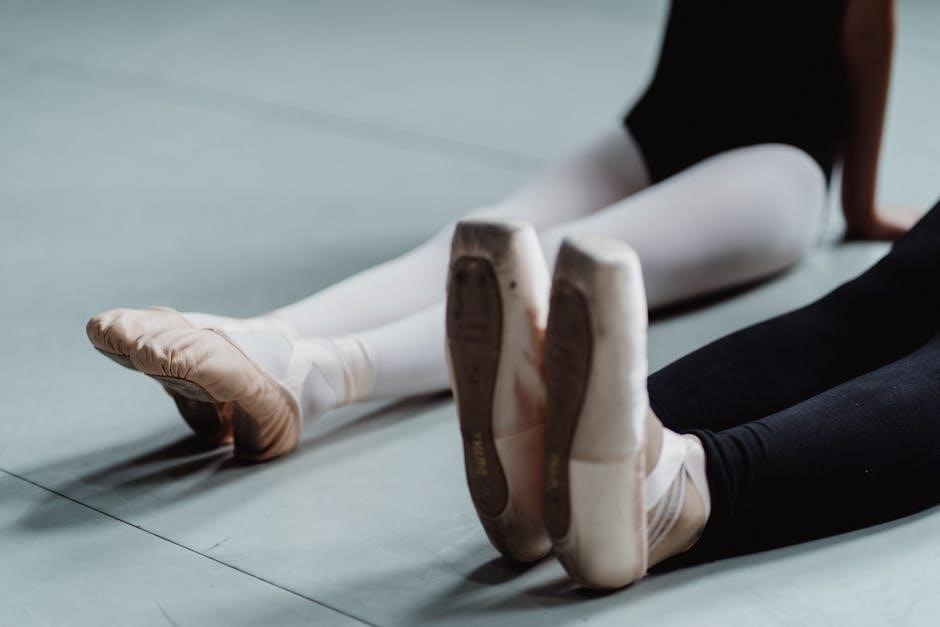MCDM, known for innovative D&D 5e content, introduces The Talent Class, a psionic hero using mind powers to overcome challenges, blending psychic abilities with strategic gameplay mechanics.
1.1 Overview of MCDM and Their Contribution to D&D 5e
MCDM has established itself as a prominent creator of unique D&D 5e content, delivering innovative classes like The Illriger and The Beastheart. Their latest project, The Talent Class, represents their take on psionics, fulfilling a promise made since the company’s inception. MCDM’s contributions include original class designs, detailed psionic rules, and extensive playtesting to ensure balance and fun. Their work bridges traditional D&D mechanics with fresh, creative ideas, enriching the game with new playstyles. The Talent Class PDF and its accompanying Talent Powers Card Deck showcase MCDM’s dedication to enhancing D&D 5e with versatile, Psychic-infused gameplay, offering players a unique hero who wields mind powers to overcome challenges.
The Talent Class is MCDM’s innovative take on psionics in D&D 5e, introducing a hero who harnesses mental prowess to battle monsters and solve challenges. Unlike traditional spellcasters, Talents rely on strain rather than spell slots, allowing continuous use of psychic powers at the risk of mental exhaustion. This system offers flexibility and versatility, with abilities ranging from combat skills like archery and stealth to advanced psionic powers. The class emphasizes strategic decision-making, where players must balance power use with strain management. The Talent Class PDF provides a comprehensive guide, including a form-fillable character sheet, ensuring players can fully embrace their psychic potential in creative and dynamic ways.

Core Mechanics of The Talent Class
The Talent Class relies on strain instead of spell slots, allowing continuous psychic power use. Manage mental fatigue strategically to maintain combat effectiveness without risking exhaustion.
2.1 How The Talent Class Differs from Traditional Spellcasters
The Talent Class diverges from traditional spellcasters by replacing spell slots with a strain system, emphasizing psychic energy management. Unlike spellcasters, Talents don’t rely on verbal or somatic components, allowing for silent, more versatile ability use. Additionally, Talents blend martial prowess with psychic powers, offering a hybrid playstyle that sets them apart from pure casters. This design enables continuous power use without the limitations of spell slots, though strain accumulation poses risks. The Talent Class introduces a fresh dynamic, combining flexibility with strategic resource management, making it distinct from conventional spellcasting classes in D&D 5e.
2.2 Strain System: Managing Psychic Powers and Their Costs
The Strain System is a core mechanic of the Talent Class, serving as a resource management tool for psychic powers. Unlike spell slots, strain represents the mental and physical toll of using psychic abilities. Each power has a specific strain cost, and exceeding your strain capacity can lead to negative effects. The system includes two types of strain: minor and major, with major strain imposing more severe penalties. Players must strategically manage strain by recovering it during short or long rests, ensuring they don’t overextend their abilities. This system adds depth and balance to the Talent Class, encouraging tactical use of psychic powers while preventing abuse.
2.3 Manifesting Powers: Flexibility and Versatility in Combat
Manifesting powers as a Talent Class character offers unparalleled flexibility and versatility in combat. Unlike traditional spellcasters, Talents can adapt their abilities dynamically, choosing from a wide array of psionic powers to suit the situation. Whether it’s dealing direct damage, manipulating the battlefield, or supporting allies, the Talent Class excels at multitasking. Powers can be used creatively, such as combining offensive and utility effects or using abilities to outmaneuver foes. This adaptability allows players to craft unique strategies, making the Talent Class a valuable asset in any party composition. The ability to manifest powers in diverse ways ensures no two encounters feel the same, keeping combat engaging and dynamic.

Character Creation and Customization
Character creation for the Talent Class emphasizes flexibility and personalization, allowing players to craft unique builds that blend psionic abilities with traditional RPG elements seamlessly.
3.1 Selecting Talents: A Deep Dive into Class Features
Selecting talents in the Talent Class is a cornerstone of character creation, offering unparalleled flexibility. Players can choose from a wide array of psionic talents, each granting unique abilities that define their playstyle. Talents are categorized into core and advanced options, allowing for both foundational and specialized builds. The system encourages experimentation, as talents can be combined creatively to suit different roles in a party. The process also involves unlocking advanced features as characters progress, ensuring continuous growth and customization. This depth enables players to craft a Talent that feels truly unique, blending psychic powers with traditional class mechanics seamlessly.
3.2 The Role of Intelligence (IQ) in The Talent Class
Intelligence (IQ) plays a pivotal role in the Talent Class, primarily influencing the effectiveness and versatility of psionic abilities. A higher IQ allows characters to access advanced talents and enhances their ability to manage strain, enabling more efficient use of psychic powers. Additionally, IQ affects the number of talents a character can know and their overall potency in combat. It also determines the character’s capacity to learn new talents and improve existing ones, making it a crucial attribute for optimizing the Talent Class’s performance. IQ further impacts skills like Insight and Arcana, tying into the class’s thematic focus on mental acuity and psychic prowess.
3.3 Customizing Your Talent: Skills, Abilities, and Playstyle
Customizing your Talent involves tailoring skills, abilities, and playstyle to suit your vision. The class offers a wide range of talents that can be mixed and matched to create unique builds, allowing players to emphasize combat, utility, or a blend of both. Intelligence and Wisdom are key determinants of a Talent’s effectiveness, but skill choices and ability score improvements provide further flexibility. Players can select skills like Acrobatics, Insight, or Persuasion to define their character’s role beyond combat. This customization ensures that each Talent feels distinct, enabling players to craft personalities and playstyles that stand out in any party composition.

Psionic Powers and Talents
Psionic powers and talents form the core of the Talent class, offering a wide array of abilities that blend psychic force, telepathy, and mental discipline. These powers are categorized into offensive, defensive, and utility types, allowing players to adapt to various combat and exploration scenarios. Advanced talents provide unique capabilities, making each Talent build distinctive. This section explores the diversity of psionic powers and how they integrate with the Talent’s class features, enabling creative problem-solving and strategic combat approaches.
4.1 Categories of Psionic Powers: Offensive, Defensive, and Utility
Psionic powers in the Talent class are divided into three distinct categories: offensive, defensive, and utility. Offensive powers focus on dealing damage or disrupting enemies, such as energy projection or telekinetic strikes. Defensive powers emphasize protection and resilience, including shields, invisibility, or mental fortification. Utility powers offer versatility, enabling abilities like telekinesis, sensory enhancements, or environmental manipulation. These categories ensure the Talent class can adapt to any situation, whether dealing direct harm, safeguarding allies, or solving complex challenges. This flexibility enhances gameplay, allowing players to craft unique strategies and playstyles tailored to their preferences and party needs.
4.2 Advanced Talents: Unique Abilities and Their Applications
Advanced Talents in the Talent class represent pinnacle abilities that showcase the pinnacle of psionic mastery. These unique powers often combine versatility with raw potency, offering players innovative ways to influence the battlefield. Examples include teleportation, aura manipulation, and advanced sensory enhancements. Unlike basic talents, these abilities frequently come with complex mechanics, such as delayed effects, area impacts, or conditional triggers. Players can tailor these advanced talents to their playstyle, creating devastating combinations or solving intricate challenges. These abilities not only enhance combat effectiveness but also deepen the class’s strategic depth, making the Talent class a dynamic and unpredictable force in any party composition.

Combat Mechanics and Strategies
The Talent class excels in combat through flexibility and strategic psionic power use, balancing offense, defense, and utility to adapt to evolving battlefield dynamics effectively.
5.1 Using Psionic Powers in Combat: Tactical Considerations
The Talent class thrives in combat by leveraging psionic powers adaptably. Offensive powers like psychic blasts or telekinetic strikes offer direct damage, while defensive abilities such as mental shields or teleports provide protection and mobility. Utility powers, like clairvoyance or psionic charm, enable strategic control and manipulation of the battlefield. Players must consider enemy resistances, positioning, and timing to maximize effectiveness. Combining powers creatively, such as using offense to soften foes and defense to protect allies, enhances overall impact. Awareness of strain costs ensures sustained power use without overextending. Mastery of these tactics allows Talents to dominate battles through versatility and strategic foresight.
5.2 Managing Strain: Balancing Power Use in Battles
Managing strain is crucial for The Talent class, as excessive use of psionic powers can lead to debilitating penalties. Strain accumulates with each ability used, and high levels impair performance, potentially causing exhaustion. To maintain effectiveness, players must balance power usage with strain recovery. Strategies include prioritizing low-strain abilities, using rest periods to recover, and leveraging abilities that reduce strain costs. Monitoring strain levels ensures sustained combat performance without compromising long-term effectiveness. Efficient strain management allows Talents to maintain their versatility and adaptability, making them reliable assets in prolonged or intense battles.

Playtesting and Feedback
The Talent class underwent extensive playtesting, with feedback shaping its design. Playtesters praised its flexibility but highlighted balance concerns, influencing final tweaks.
6.1 Overview of The Talent Beta Round 2
The Talent Beta Round 2 focused on refining core mechanics and addressing balance concerns. Players tested updated strain systems, talent progression, and psionic power scaling. Feedback highlighted the class’s flexibility but revealed complexities in managing strain during prolonged combat. Playtesters appreciated the expanded talent options but noted some powers felt underwhelming compared to others. The beta also introduced clarity improvements to ability descriptions, making the class more accessible. Overall, Round 2 laid the groundwork for a balanced yet versatile class, addressing key issues while maintaining its unique identity in the world of D&D 5e.
6.2 Feedback from Playtesters: Strengths and Areas for Improvement
Playtesters praised The Talent Class for its unique blend of flexibility and narrative depth, with many highlighting its versatility in both combat and role-playing scenarios. The strain system was commended for adding strategic depth, though some found it complex to manage. Psionic powers were a hit, offering creative problem-solving opportunities. However, feedback also revealed areas for improvement. Some talents felt underpowered compared to others, and the class’s reliance on Intelligence (IQ) left little room for diverse character builds. Playtesters also noted that the class could benefit from clearer explanations of advanced mechanics. Overall, the feedback emphasized the class’s potential while pointing out balance and clarity issues.

The Role of The Talent in a Party

The Talent Class excels as a versatile, adaptive supporter and problem-solver, complementing traditional roles with psionic abilities while enhancing party dynamics through unique contributions.
7.1 Synergy with Other Classes: How The Talent Fits into a Team
The Talent Class seamlessly integrates into diverse party compositions, offering psionic versatility that complements martial, ranged, and spellcasting classes. Its abilities enhance allies, control battles, and adapt to threats, making it a dynamic team player. By combining crowd control, debuffs, and damage with Fighters or Rogues, the Talent amplifies combat efficiency. It also synergizes with spellcasters like Wizards or Clerics by enhancing elemental resistances or boosting spell effects. Additionally, the Talent’s utility powers support Bards and Druids in managing resources and terrain. The class’s flexibility ensures it strengthens any party’s capabilities without overshadowing others, creating a balanced and cohesive team dynamic.
7.2 Unique Contributions: Why The Talent is a Valuable Addition
The Talent Class brings unparalleled versatility and adaptability to a party, offering unique psionic abilities that fill gaps traditional classes cannot. Its psionic powers provide solutions to challenges that require creativity, such as manipulating minds, altering environments, or bypassing obstacles. The class’s ability to adapt to any situation makes it indispensable, whether through crowd control, damage, or utility. Additionally, its Strain system encourages strategic thinking, adding depth to gameplay. As a homebrew class supported by MCDM, the Talent offers a fresh, balanced, and engaging playstyle that enriches any campaign with its innovative mechanics and limitless possibilities, making it a standout addition to any party composition.

Advanced Techniques and Builds
Optimizing your Talent build involves advanced strategies, combining abilities, and min-maxing to create a powerful character, tailored to your playstyle and party composition for maximum effectiveness in every scenario.
8.1 Optimizing Your Talent: Advanced Strategies
Optimizing your Talent involves carefully selecting talents that synergize with your playstyle and party composition. Focus on abilities that enhance versatility, such as Meta-Psionics for power customization or Cerebral Cloak for defensive utility. Managing Strain effectively is crucial; prioritize powers with lower strain costs for sustained combat. Leverage your Intelligence score to unlock higher-level talents, ensuring consistent power progression. Consider your role in the party—whether as a damage dealer, supporter, or controller—and tailor your choices accordingly. Experiment with advanced techniques like combining lower-level powers for complex effects or timing ability uses for maximum impact. This strategic approach ensures your Talent stands out as a formidable and adaptable class in any campaign.
8.2 Min-Maxing: Creating a Powerful Talent Build
Min-maxing your Talent involves strategically prioritizing high-impact talents while minimizing less effective ones. Focus on talents that scale well with Intelligence, such as Meta-Psionics or Cerebral Cloak, to enhance your psychic abilities. Invest heavily in Intelligence to unlock higher-level powers and improve their potency. Consider combining talents like Power Surge with Psionic Precision for devastating effects in combat. Avoid talents with overlapping functions or high strain costs unless they offer unique benefits. Optimize your ability scores, ensuring Intelligence is your highest stat, and allocate feats or racial traits to further enhance psychic mastery. This approach creates a highly efficient, powerful Talent build tailored for peak performance in any campaign.

The Talent and Psionics PDF
This comprehensive guide details the Talent class, its psychic abilities, and customization options, offering a deep dive into MCDM’s innovative approach to psionic mechanics in D&D 5e.
9.1 Content Overview: What’s Included in the PDF
The PDF provides a comprehensive guide to the Talent class, detailing its core mechanics, customization options, and psionic abilities. It includes a detailed breakdown of psionic powers, categorized into offensive, defensive, and utility types, along with advanced talents that offer unique playstyles. The document also covers character creation, emphasizing the role of Intelligence (IQ) in shaping abilities and playstyle. Players can explore example builds and strategies to optimize their Talent. The guide is designed to enhance gameplay by offering flexible and versatile options, making the Talent class a dynamic addition to any D&D 5e campaign. It’s a must-have for fans of psionic mechanics.
9.2 Layout and Design: Navigating the Document
The PDF is meticulously organized with a clear and intuitive layout, making it easy for players and DMs to navigate. The document features distinct sections with headings, subheadings, and bullet points for quick reference. Tables, diagrams, and sidebars are used to present complex information in an accessible way. The design incorporates a clean, modern aesthetic with consistent fonts and colors to enhance readability. A detailed table of contents and internal bookmarks allow users to jump to specific sections effortlessly. The layout ensures that rules, abilities, and customization options are presented logically, making the guide both user-friendly and visually appealing for an optimal learning experience.
9.3 Additional Resources: Talent Powers Card Deck
The Talent Powers Card Deck is an exceptional supplementary resource designed to enhance gameplay and organization. Each card corresponds to a specific Talent power, detailing its rules, effects, and requirements. This deck streamlines combat and skill use, allowing players to reference abilities quickly without flipping through the PDF. The cards are visually appealing, with clear layouts that prioritize readability. They also include iconic artwork that immerses players in the world of psionics. Perfect for both players and DMs, the deck adds a tactile element to the game, making it easier to manage complex abilities during sessions. It’s a must-have for anyone looking to elevate their Talent class experience.
The Talent class redefines psionics in D&D 5e, offering flexibility and strategy. MCDM’s innovative design enhances gameplay, making it a standout addition for players seeking depth.
10.1 Final Thoughts on The Talent Class
The Talent class offers a fresh, dynamic approach to psionics in D&D 5e, blending flexibility with strategic depth. Its unique mechanics, such as the Strain system, encourage thoughtful resource management while maintaining excitement in combat. Players will appreciate the extensive customization options, allowing for diverse builds that cater to individual playstyles. The class’s versatility makes it an excellent fit for any party, whether focusing on offense, utility, or defense. With its well-balanced design and rich thematic elements, The Talent class is a standout addition to the game, providing endless opportunities for creative expression and tactical gameplay.
10.2 The Future of MCDM and The Talent Class
MCDM’s The Talent class has set a new standard for psionic play in D&D 5e, and its future looks promising. With ongoing feedback from the community, MCDM is likely to refine and expand the class further, potentially introducing new talents, balancing adjustments, and additional playstyles. The success of The Talent PDF highlights a growing demand for innovative, mechanically rich content. As MCDM continues to innovate, players can expect more resources, including digital tools and supplementary materials. The Talent class is poised to become a cornerstone of psionic play, offering endless possibilities for players and Dungeon Masters alike in future campaigns.
